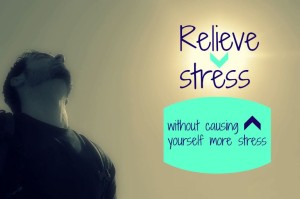By: Shane Adamson
Categories:
Relieve Stress Without Causing Yourself More Stress
Stress can be harmful. As you know well, stress can make you feel the same symptoms you feel when you are sick. To get rid of stress, you must do three things:
- Identify the stressor.
Your stressor is what is causing you stress. Take a moment to analyze your current situation. Think about things that currently concern you. Think about the changes that have recently happened or you are expecting in the near future. Remember that stress comes from good and bad life changes. Even a birthday party is stressful! Your stressor could be anything from your upcoming marriage to losing a job. No matter what is causing you stress, once you have identified it, you made a simple but imperative step in relieving your stress. Now you must:
- Make a decision.
Decide if you have control over the stressor in your life. Depending on your answer, there are two different ways that you can cope with your stressor.
- Use appropriate coping strategies for your situation.
If you do have control over the stressor, then you can resolve stress using task-oriented coping strategies. This means that you can do things that will help the situation you are in. For example, if your stressor is an upcoming project at work that’s very difficult for you, you can relieve your stress by quitting your job (although that is not recommended), you can relieve your stress by scheduling your time, using effective time management, studying and researching information that you lack, or reaching out for help from an expert in your company or the field. As a result of these efforts, your difficult work project will be possible and it won’t stress you out as much.
If you do not have control over the stressor in your life, you cannot cope in this same way. For example, if you have a family member pass away (you don’t have control over that situation), you can’t use task-oriented coping strategies. Instead, you can use emotion-focused coping strategies to help you relieve stress. Emotion-focused coping means you cope by dealing with your difficult emotions. Just make sure that you deal with your emotions in a healthy way and don’t tune out your emotions. You can do something that you personally like to do such as listen to music, read an interesting article, or exercise, take time to honor your loved one, take time to take care of yourself, practice self-compassion, and/or talk with a friend. These strategies will ease your mind and help decrease your stress.
No matter what is causing you stress, you can find relief. However, there is a possible danger in seeking to relieve your stress. Chris Lowry, Ph.D. of the BYU-Idaho Psychology Department warns, “Most people have a problem when they use emotion-focused coping strategies when they should be task-oriented.” To exemplify this, take the same situation above. Your work project is causing you so much stress because you have a big test coming up. To relieve your stress, you decide to take a few days off of work to go on a shopping trip. Supposing you like to shop, you are temporarily enjoying your time shopping, but you are actually creating more stress for yourself overall. This “stress-relief” actually creates more stress for you as you won’t have enough time to finish your project, or do a good job on it.
If you are stressed, follow these two steps and reduce your stress in the right way. You will be happier. If you need help learning how to cope with stress or are faced with a significant stressor, seek help today. Schedule an appointment with one of our compassionate, knowledgeable counselors today!

